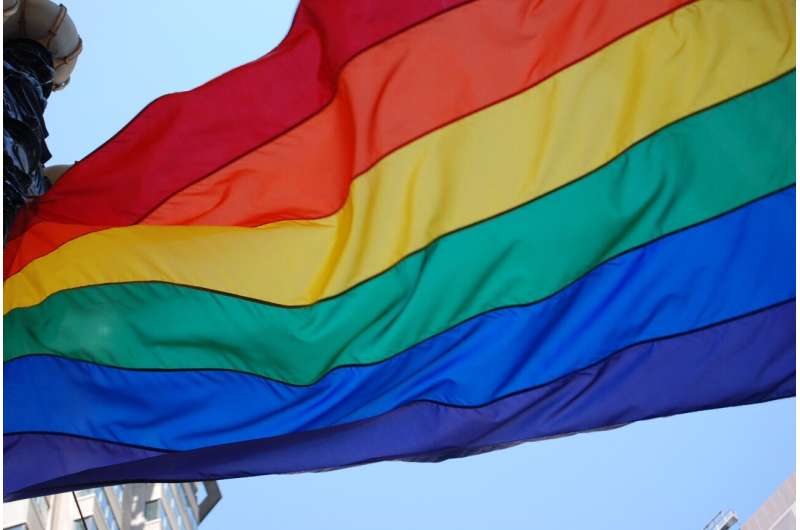Pride flag. Credit: Nancy Dowd, Pixabay
A Western Sydney University study has found that transgender women from culturally and linguistically diverse (CALD) backgrounds are more likely to be the victim of sexual harassment and violence than other women in Australia.
2295 women participated in a nation-wide survey, which aimed to explore women's lived experiences of sexual assault and harassment, and their responses to violence.
Of the survey respondents, 180 were transgender women and 15 percent of these women were from CALD backgrounds. 31 transgender women from CALD backgrounds were also interviewed and provided photographs about their experiences.
Professor Jane Ussher from the Translational Health Research Institute (THRI) at Western Sydney University was the lead researcher on the study, which is being published today by Australia's National Research Organization for Women's Safety (ANROWS).
Professor Ussher said an overwhelming majority of the women, across all gender and sexual orientations and backgrounds, indicated that they had experienced sexual violence.
"Over two-thirds of all the women reported that they had experienced a sexual assault from the age of 16. But what really stood out in the results, is that the transgender women from CALD backgrounds were more likely to report sexual harassment and sexual assault than the other women," said Professor Ussher.
The results indicate that the CALD transgender women:
- Reported more frequent sexual harassment than other women: 70% were harassed 10 or more times, compared to 40% of non-CALD transgender women, and 56% of cisgender women (women whose gender identity matches their sex at birth.)
- Were twice as likely to report having been assaulted 10 or more times: 28% compared to 12% of non-CALD trans women, and 16% of cisgender women.
- Reported the highest rate of sexual assault by a stranger: 44% compared to 26% of non-CALD trans and cisgender women.
- Were more likely to report being sexually assaulted outside the home: 41% compared to 16% of other women.
- Received no support from the police or the legal system following assault.
Professor Ussher said the study highlights a terrifying reality for transgender women in Australia—where sexual assault and violence is part of their everyday, lived experience.
"Many women live with an understanding that they may be at risk of sexual assault or violence—but for transgender women, the threat is all pervasive, it's an everyday occurrence, and the threat of physical or sexual violence is everywhere," said Professor Ussher.
Professor Ussher said experiences of sexual harassment and transphobia can increase during the gender transition process. When the woman is also from a culturally diverse background, she said racism can occur concurrently and can often compound or exacerbate the acts of physical and sexual violence.
"During the process of gender affirmation, many of the participants experienced transphobic sexual and physical violence, which they had not experienced previously," said Professor Ussher. "Many of the women described a difficult journey towards social acceptance, experiencing intersecting racism and transphobia in public, as well as within workplaces and the queer community. Being able to 'pass as a woman' did result in a level of social acceptance and reduced the risk of transphobic violence. However, some women found it more difficult to pass if they did not meet narrow definitions of Anglo or white hetero-femininity."
The results of the "Crossing the Line' study and accompanying exhibition of photographs and women's stories, are being released this week by ANROWS in the report "Crossing the line: Lived experience of sexual violence among trans women of color from culturally and linguistically diverse (CALD) backgrounds in Australia."
Professor Ussher said the Report highlights some important issues, in relation to transgender women from CALD backgrounds feeling excluded from community support services.
"CALD trans women were more likely to report no support compared to other groups of women," said Professor Ussher. "Some of the women described negative experiences associated with seeking support from healthcare professionals or the police following sexual violence, with individuals and services being described as transphobic or disrespectful to trans women of color. As a result, many women felt that formal support services, which are typically available to women after sexual assault, were not accessible to them or did not adequately address their concerns and needs."
ANROWS CEO Dr. Heather Nancarrow said the research demonstrates that the absence of culturally competent information and knowledge about transgender experience, accompanied by misinformation, can lead to stigma, prejudice and discrimination.
"This results in unmet health and justice needs for trans women," said Dr. Nancarrow. "There is a clear need for community-wide activities that challenge attitudes condoning sexual violence against women. This means we must ensure that our words, policies and practice guidelines promote respect for gender, sexuality and cultural diversity. We must demonstrate zero tolerance of sexual violence against any woman."
More information: Crossing the Line: www.anrows.org.au/project/cros … rounds-in-australia/
Provided by Western Sydney University





















